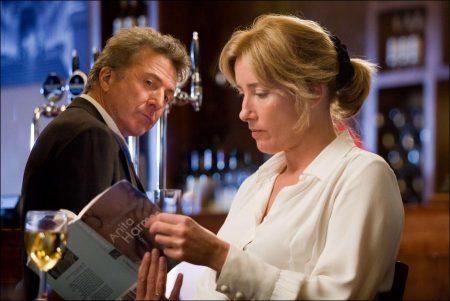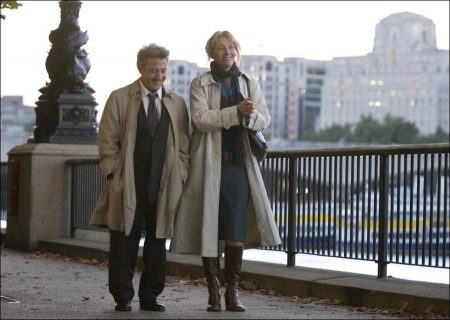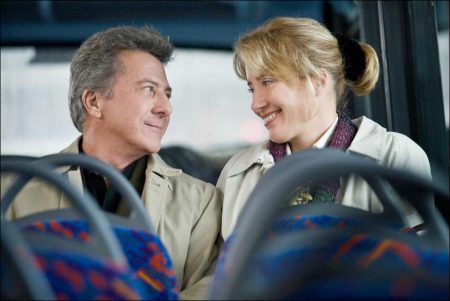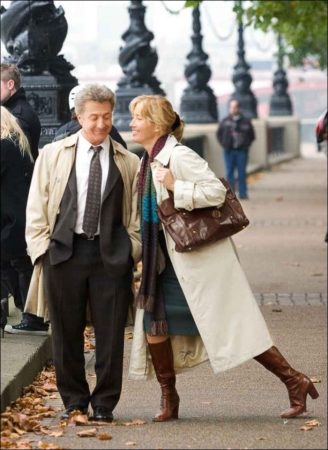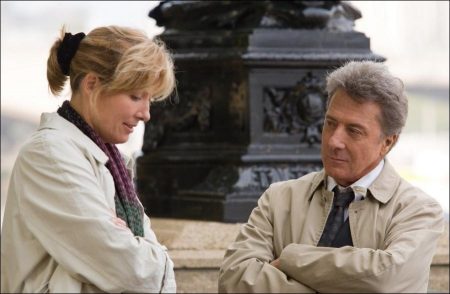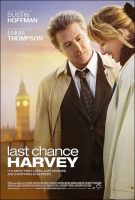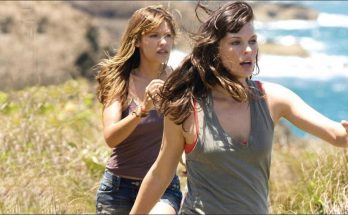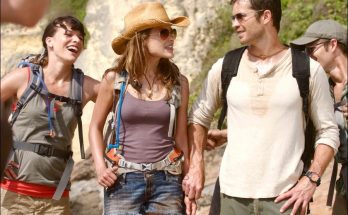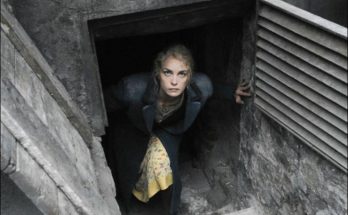Tagline: It’s about first loves, last chances and everything in between.
Last Chance Harvey movie storyline. New Yorker Harvey Shine (Dustin Hoffman) is on the verge of losing his dead-end job as a jingle writer. Warned by his boss (Richard Schiff) that he has just one more chance to deliver, Harvey goes to London for a weekend to attend his daughter’s (Liane Balaban) wedding but promises to be back on Monday morning to make an important meeting-or else.
Harvey arrives in London only to learn his daughter has chosen to have her stepfather (James Brolin) walk her down the aisle instead of him. Doing his best to hide his devastation, he leaves the wedding before the reception in hopes of getting to the airport on time, but misses his plane anyway. When he calls his boss to explain, he is fired on the spot.
Drowning his sorrows at the airport bar, Harvey strikes up a conversation with Kate (Emma Thompson), a slightly prickly, 40-something employee of the Office of National Statistics. Kate, whose life is limited to work, the occasional humiliating blind date and endless phone calls from her smothering mother (Eileen Atkins), is touched by Harvey, who finds himself energized by her intelligence and compassion. The growing connection between the pair inspires both as they transform one another’s lives.
Last Chance Harvey is a 2008 British-American romantic drama film written and directed by Joel Hopkins. The screenplay focuses on two lonely people who tentatively forge a relationship over the course of three days. Dustin Hoffman plays an American composer who loses his job and his position of father of the bride in the course of a single day overseas while Emma Thompson plays an airport worker with a jaundiced view of relationships.
About the Production
Writer and director Joel Hopkins’ quirky and original feature film debut Jump Tomorrow charmed critics on both sides of the Atlantic and won him the 2002 BAFTA Award for Most Promising Newcomer. It also attracted the attention of Academy Award winning actress Emma Thompson, who was intrigued enough to sit down with Hopkins to discuss working together on a future project. “She said she liked my work and I’m obviously a big fan of hers,” says Hopkins. “So I went away and thought of an idea for a character she could play. That was the beginning of this character Kate, who I just knew that Emma would be perfect for.”
For producer Nicola Usborne, the film was a great collaboration between the stars and their director, and ultimately a very personal film for Hopkins. “He came up with the idea, he wrote it, he developed this great relationship for Kate and Harvey. He grew up in London but spent a lot of time in America and I think it’s not a coincidence that this film is about an American in London as sort of a fusion of Joel’s two worlds.”
According to Tim Perell, who also produced Jump Tomorrow with Usborne, it was the writer-director’s utter lack of cynicism that caught Thompson’s eye. “She was interested in doing some kind of love story and Joel is one of these very people who sees the world in a very warm, rosy way. I don’t know if it’s that he’s completely naïve or he just lacks that irony gene that the rest of us all seem to have. But I think that’s one of the things that Emma really responded to in him. There is such warmth coming out of everything he does. He wrote such a richly detailed character that she responded positively to it.”
Hoffman and Thompson worked previously together, for the first time, on Stranger Than Fiction. “We only had a couple of scenes together in that film,” says Hoffman. “We used to walk the streets, learning our lines. We’d try to say them so people would think we were really just having a conversation that they were eavesdropping on. We really liked each other and responded to the way each other works. So at the end of the shoot, we said someday maybe we’ll get to make a movie together where we have bigger parts. And then she called me back in about a year. She’d met Joel Hopkins and he wrote something and I read it and we thought, wonderful—we can work together.”
“Dustin and I knew that we had chemistry,” says Thompson. “That is just something that happens sometimes—but not as often as you’d like. When Joel contacted me and asked if I had any thoughts about Last Chance Harvey, I said this would really suit me and Dustin down to the ground. If you make it specifically for him, I think this could work.
“Normally these things never work,” adds the actress. “It all sounds lovely— somebody who’s written his second script for two specific actors. It sounds like a no brainer, but it never gets made. It’s only because Dustin agreed to do it and agreed to do it for a lot less than he would normally be paid that it happened.”
The project actually came together very quickly, according to producer Perell. “Emma read the first draft of the script within twenty-four hours and sent an email saying ‘love it love it love it, let’s do it, can I send it to Dustin.’ You don’t say no to that.’
“I frankly thought it would just disappear into the ether,” says Perell. “But about forty-eight hours later she forwarded an email from Dustin with his very positive response. This was pretty much the first draft of the script and they all had notes and Joel kept tinkering away on it, but we had kinds of commitments we needed from Emma and Dustin to move forward in record time.”
Perell took the script to Robert Kessel of the recently formed studio Overture Films. “We all felt a certain amount of allegiance to Robert,” he says. “He’s been a fan of Joel’s for many years. In fact, he was on the jury when Joel’s NYU short film won the grand prize. The response from Overture was incredibly encouraging and so we just pursued the relationship with them.”
For Hopkins, the opportunity to explore the idea of a more mature love affair between two very different characters was irresistible. “I think slightly older characters are just so much more interesting,” says the filmmaker. “They’ve experienced so many more things and they’ve got so much more baggage, which is good. Baggage is always interesting.”
Hoffman concurs: “I think one of the things that happens when a marriage fails is that you realize you don’t know what you think you know. You knew that this person was the one for you—or you thought you did—and it shatters your belief system and you shut down. What makes this film interesting is that these are two people who are no longer in the flush of youth. They’ve been so pained by the expectation of what they thought they were going to have, that they very much do not want to get involved with each other and I think that gives the film tension.”
As Thompson points out, “In fact, I think, falling in love when you’re older is devastating. It’s an enormous thing to happen, especially when you don’t think it’s going to come your way. Both of these characters in some way or other have resigned themselves. Not without effort, not without still wanting to work and do good things and have an interesting life. They still want all that, but the opportunities seem to be just out of their reach.
“I want to see people who I actually believe to exist, who are vaguely like me, falling in love,” she adds. “People who aren’t perfect, who aren’t so beautiful that anyone would go for them. You don’t see love stories about that, you just see very beautiful people falling in love with each other and I’m just bored, I’m bored witless. I don’t care about them!”
Thompson says she based her performance on real women she knows who just haven’t found the right person. “It doesn’t really matter what the age is,” she says. “It’s just not quite being able to find to find that connection—and not from want of trying. Kate does try. But it’s only somebody like Harvey who just happens into her life and won’t give up that makes her let her defenses down.”
Thompson, an Oscar -winning screenwriter herself, says she usually cautions against writers directing their own material. “But Joel had written and directed Jump Tomorrow, which I really loved and so I knew he was more than capable of directing his own script. For a young man on his second movie to be directing a movie legend like Hoffman is extraordinary. I don’t think Joel had ever worked with an actor who found their way towards the lines in quite such a unique fashion.”
Hopkins admits he learned something new every day on this shoot. “It’s been a pretty humbling experience, but amazing fun. I got very used to watching the actors but then suddenly I’d see them on the monitor, and I’m like, oh my God, that’s Dustin Hoffman and Emma Thompson and I’m directing them!”
“Kate and Harvey are at similar sticky points in their lives when they more or less collide,” Hopkins explains. “There aren’t many more chances. I think Dustin’s character is feeling the clock ticking and he’s looking for a chance to reshape things. He had decided his fate was this one thing and suddenly he gets this shot of energy that he’s determined to make the most of.”
Hoffman observes that Hopkins is the kind of director who visualizes every shot before he ever sets foot on set but still allows improvisation. “He recognized the energy Emma and I have together and he was responsive to it,” says the actor. “We didn’t know the way the scenes would go. Sometimes we would see a scene that he had written and say to him, ‘We don’t think we have to say all of these lines, to make the scene work.’ I think Joel liked it.”
Working with two extraordinarily gifted and experienced players, says Hopkins, made him reconsider some of his preconceived notions about the film. “I learned that I actually have a better sense of what I’m after than I thought I did. It allows me to hopefully be a bit freer ultimately, because I know I do have a quite good sense of what the essence of each scene is. The flipside is that I can probably be a bit precious with it and say, ‘That’s not how I wrote it.’ The challenge was to be open to what’s happening and to realize when what’s happening on set is better than what I wrote.”
Tim Perell observes that everyone involved with Last Chance Harvey, from the stars to the studio, took a leap of faith in putting the project in the hands of a sophomore director. “Joel’s first movie was a million dollar movie with great actors, but no movie stars and a very small crew,” says the producer. “This is a huge jump for him. None of us knew what it was going be like. He’s done an extraordinary job and he’s had a lot to deal with. He’s made a movie with a studio for the first time, with an enormous crew and a lot of money on the line. He’s had two major movie stars that have needed him through this movie and he’s been able to manage them and support them and give to them in a way that has shown up on screen in a great way. You can see the connection Dustin and Emma have with Joel and the trust that they have in him up there on the screen.”
Casting Last Chance Harvey
“I think it’s true when they say directing is mostly getting your casting right,” says Hopkins. “I got it right and I didn’t need to do much more. I’m just there to tell them where to stand.” Having Hoffman and Thompson onboard made it easier for filmmakers to assemble a stellar supporting cast, says producer Nicola Usborne. “When you have Dustin and Emma you can attract a lot of fantastic actors.”
Hopkins’ rule for identifying the right actors for the film was simple: “I think I wrote it on a Post-it note, ‘No baddies in this movie.’ I wanted everyone to have three dimensions, at least, and not be caricatures. We got this great start obviously with Dustin and Emma, but each role has a key part to play and you must keep up the strength in casting all the way through the film. We ended up with an embarrassment of amazing talent. We have great actors playing crucial roles that could so easily be black and white characters that you just write off.”
Perell agrees: “We were so lucky with the casting, so lucky. Richard Schiff as Harvey’s boss, Marvin, was a revelation. Kathy Baker is a dream and James Brolin is exactly who Joel originally conceived for the part. We felt so lucky to convince him somehow to come over to London for two weeks and do this. Liane Balaban is just a huge, huge discovery.
“Eileen Atkins is perfect for the role of Kate’s mother, Maggie,” continues the producer. “She and Emma do actually kind of look alike and there’s this phenomenal chemistry between them. Again, it comes back to the Joel Hopkins view of the world. There is an enormous amount of warmth and humor, but also a certain amount of frustration as well.”
Those nuanced performances proved invaluable in quickly conveying the two main characters’ histories and complex emotional states. “We didn’t have a lot of time for back story for each and every character. In the wedding sequences, we really have to see Harvey’s past very economically painted and when you have this level of actors, they really help you achieve that.”
Hopkins concurs, adding, “I can do a bit with the writing, but when you get solid actresses like Kathy and Eileen, they help to make these smaller parts really come to life. They all made their roles more than I wrote. I learned new stuff about the characters each day because they knew them better now than I did.”
With Hoffman and Thompson he says, “The best thing for me to do is to give them a lot of freedom and be there when they need me.”
Producer Perell was fascinated by the difference between the two stars’ acting techniques. “Emma couldn’t be more different in terms of her process than Dustin. She has a calmness and a groundedness that’s just extraordinary to watch. When she comes in, she’s clearly thought an enormous amount about what she’s doing, about every inch, every word that she has to say. And she’ll do it as many different ways as is needed, but it seems sort of effortless with her.
“Whereas with Dustin you see the machinery at work, he’s very naked with his process,” observes Perell. “He has this completely sprawling mind, but nothing escapes him. Every detail is examined, is questioned, is analyzed, is processed and what’s really most fascinating is that you see him processing it and he’s processing it as Harvey, not as Dustin. It elevates the performance. It elevates all of us, but you definitely cannot relax, you cannot sit back. Things will be questioned, so you always need to know why and where and how.”
Thompson says it’s working with Hoffman that is effortless. “We both work in the same way in the sense that we want to be completely real, completely spontaneous. You can only do that with a limited number of people. The fact is, I don’t care what his process is, we just get on set and play. Dustin is such a consummate artist. Every single moment has to be found and made and newly minted.”
“Emma and I have done character roles all our acting lives,” Hoffman points out. “This time, we wanted to do something very close to ourselves.”
“Emma can be sitting on a bus by herself, as she is in one of the scenes here,” Hoffman continues. “She just puts her head against the glass and there is an essence of such vulnerability. In life there’s a lot of time when we’re really alone and don’t want to be. She just has that in her in her soul and it’s extraordinary how she shares that with us.”
Hoffman and Thompson have as much in common as they do in contrast, according to Usborne. “Both Dustin and Emma have this facility with comedy and drama, and they can move so lightly between the two. There are some very, very funny moments in the film, and I don’t think they detract from the sort of truth and honesty of the emotion.
“At the beginning of the script, Harvey does things that make the audience question him, and yet there is something about Dustin Hoffman and the way he plays this part that makes you really believe in him and feel for him,” says the producer. “You never lose that sympathy for him even though you might think some of his choices have not been correct. As soon as you see him on camera you completely sympathize with him. I don’t know what it is about his face or his body language that just allows you to be aligned with him, almost no matter what he’s doing.”
James Brolin, who plays Harvey’s ex-wife’s current husband, is “as manly as any man can be,” says Perell, “He’s got this amazing shock of white hair, he’s incredibly tall, and undeniably handsome. There’s something very imposing about him, so when Harvey arrives at the rehearsal dinner and we reveal his ex-wife with James Brolin, again your heart just breaks for poor Harvey, because this is what he’s got to go up against.”
Brolin says few many romantic pictures work as well as this one does. “First of all, Joel writes good material. He works from a very sweet and definite position. He believes that no matter how far the chips are down, there’s no such thing as, ‘That’s it.’”
Brolin was also impressed with Hopkin’s soft spoken assurance as a director. “You quietly bring your chair closer to him so that you can hear him better, rather than back off and say okay, okay, okay I’ll think about that.”
Harvey’s estranged daughter is played by up and coming young Canadian actress Liane Balaban. “When I first read the script, I knew it was such a beautiful, thoughtful story that it really needed to be told. What was touching to me was the real honest human kind of damage that all the characters have, especially Harvey. He’s honest and real and not that likeable. He’s made the kind of mistakes in his life that a lot of people have, so I think many people can identify with the estrangement and families going astray, being alone in life, facing really difficult odds.”
She describes working on the film as “the best acting school in the world. Dustin examines everything and he asks himself if every moment is true to life, so he really brings himself to the character. He also likes to play around; he likes to improvise a little bit, which is exciting and kind of scary.”
Daniel Lapaine, who plays Liane’s bridegroom, signed up solely on the strength of the cast. He had never even seen the full script. “Often in these Hollywood films, they’re quite secretive about letting people see the scripts,” he says. “I’d only seen my scenes, but when I heard that Dustin Hoffman and Emma Thompson were in it, it would have been pretty hard to say no.”
Lapaine says he’s delighted with that decision. “I’m working with Dustin Hoffman,” he says. “I mean, it doesn’t get much better than that. He raises your game and makes you better. I couldn’t give more of a compliment to him than that.”
Paris on the Thames
The London of Last Chance Harvey will surprise some people who know the city well–or think they do. Rather than set the action against such familiar landmarks as Big Ben and Buckingham Palace, the filmmakers give viewers an insider’s perspective of the English capitol. As Harvey and Kate get to know each other, they wander the streets in a series of impromptu walking tours that showcase London as a city to fall in love with—and in.
“It’s a very romantic city,” says born-and-bred Londoner Emma Thompson. “It’s full of incredible nooks and crannies and views and vistas. I actually get quite homesick for London, so coming back was a pleasure. The picture is a bit of a valentine to the city.”
The pair’s walks take them all over the city, from the courtyard of the immense 16th century palace Somerset House at dawn to the south side of the Thames in the late afternoon sun.
By painting a picture of the city through Harvey’s eyes, where everything looks new, Hopkins was able to depict London in a way it has never been seen onscreen. “This is a more elegant side of London than is typically featured in films,” says the director. “I definitely wanted to capture the excitement of being in a city you’ve known quite well, but have been away from and are looking at with fresh eyes.”
Achieving that freshness in one of the oldest and most photographed cities in the world was a challenge, says production designer Jon Henson, who has worked on numerous London shoots. “We were constantly looking for new places, or places we have seen before but are looking at in a different way. In the end, it was a process of choosing the right elements. Joel wanted to have an international-looking London, so it wasn’t the sights of London so much, but something that could be London, could be Prague, could be Paris. We felt that looking at the older elements in the city would be more romantic.”
“It really does feel like you’re walking along the Seine in Paris,” says Tim Perell of the couple’s strolls along the Thames. “The Southbank Center and the whole walk along there really is modern London. And you can see across the river to old London, to St. Paul’s Cathedral and all these old great English buildings. Then in the background are all these huge cranes and you see where London is going. It’s just one of the most spectacular places in London, I think.”
In fact, the image of “London as Paris” was the film’s guiding visual philosophy. “It wasn’t meant to be a picture postcard or something that you might see in a tourist book, but a very romantic backdrop for two people falling in love,” says producer Nicola Usborne. “We wanted to make a film about two people getting to know each other and falling in love over a weekend in a sort of iconic London.”
“There’s a lovely scene where Harvey’s waiting for Kate outside her evening class and we found this autumn grass that was about six-feet high just gently blowing in the wind,” he says. “We sat Harvey in front of this. He’s quite a wistful character anyway and he’s constantly in thought. The image of him in front of this grass was just glorious. We latched on to all the autumnal colors of that scene and started to develop those throughout the film.”
Hoffman credits Hopkins and cinematographer John de Borman for helping him to see London in a new light. “They really did find the romance that’s in London. The locations were very carefully picked by people who really knew the city. I’d been to London many times in the last thirty years but I’d never seen some of those locations.”
That visual approach to the setting carried over to the lead characters, according to Perell. “We really wanted Dustin and Emma to look sexy and beautiful. You don’t often see people of that age looking beautiful and sexy onscreen, and that was a really important component of it. Emma wears a green uniform throughout, but we had it tailored and fitted so that it actually makes her look really sexy.”
What the filmmakers did not want was “a sugar-coated romantic comedy,” says Perell. “As much as I enjoy those movies, that wasn’t right for this story. But it wasn’t a small, independent British movie either. Our audience is sophisticated, so it had to have a certain look and beauty to it. We needed something that was incredibly elegant, that looked really beautiful and rich but authentic, like the performances, real, but with a sheen to it.
London also provided the filmmakers with what they feel was an ideal crew. “They all really genuinely responded to the script,” says Hopkins. “You could just tell that everyone seemed to get something out of the script and it felt like we were all trying to make the same movie.”
Director of photography John de Borman has shot everything from gritty independents like Hideous Kinky to slick Hollywood romances including Shall We Dance. That range made him the perfect choice for this film, says Perell. “We knew Joel was going be sucked into the world of the actors and we wanted somebody who could be a real rock for Joel and help him through the coverage. John is also someone that Dustin and Emma could see behind the camera and be reassured that there was someone on hand with his degree of wisdom and experience.”
Hopkins says he depended on de Borman’s expertise from day one. “I told John ‘This is a big step up for me. I’m working with A-list actors and I’ve never done that before. I’m nervous and I need you to really be in charge of the shots.’”
The writer-director admits, though, “When it comes down to it, I’m bit of a control freak, so when Dustin and Emma didn’t need me, I had to go somewhere.”
The film, says production designer Henson, is split into three worlds. “You have Harvey’s world, Kate’s world and then Harvey’s daughter’s world. Harvey is very tired, his job’s a dead end job. We went for lots of beige and dusty colors, dated furniture. All the stuff we used in his recording studio is very old fashioned. His world is out of date in contrast to what we see in his daughter’s world, which has lots of reflection, lots of expensive fabrics. It’s much glossier. Kate’s world is incredibly natural and down to earth. There’s a contrast and juxtaposition there that that hopefully is quite dynamic.”
“Last Chance Harvey is a very romantic film,” says Nicola Usborne. “We watch two people who had given up on love find it again, and I think we believe that they will continue with that love. It’s not that there won’t be hiccups along the way, but I do think you leave this film with a sense of hope and optimism and romance. We always joke that Joel can’t make a film with a sad ending. He has a very romantic spirit.”
Thompson says the point of the film is very simple. “It’s about love. It’s about human connection. It’s about two people allowing themselves to love at a time of life where it might not be the easiest option. For Harvey, you know it’s his last chance. And possibly, very possibly, it is for Kate. Yes, she’s got her life, she does her thing, she looks after her mum, and she’s very good at it all. Maybe she’ll write that book and maybe, maybe, maybe. Then something happens to illuminate her life.”
The character of Harvey and his emotional dilemma came from a very personal point of reference for Hoffman. “I just played what my life would be like if I had not met my wife Lisa, who I’ve been with for about 34 years,” he says. “That wasn’t hard to do, because after that first real love affair fractures, you really do feel love’s just not meant for you.”
As a woman still in her 20s, Liane Balaban found the movie enormously inspiring. “This is an adult love story about people with life experience. It’s not your typical boy meets girl boy loses girl. There’s so much more going on and the relationship between them is so much more complex and interesting than a lot of the relationships you see in other movies.
“I think it’s saying that you always have a chance, that there’s never a situation that you can’t try to make better,” says the actress. “Even when you think you’re at the end of your rope, there’s always a little more.”
“I’m not interested in twenty-somethings falling in love,” Joel Hopkins says. “They’re not ready. This kind of relationship isn’t often depicted, but it’s fascinating in a way that twenty-somethings can’t be. It takes time to become fully realized people and I guess that it has taken these two people a long, long time to do that. But now, they’re ready to fall in love.”
Last Chance Harvey (2009)
Directed by: Joel Hopkins
Starring: Dustin Hoffman, Emma Thompson, Kathy Baker, James Brolin, Eileen Atkins, Richard Schiff, Liane Balaban, Wendy Mae Brown, Bronagh Gallagher, Jeremy Sheffield, Daniel Lapaine
Screenplay by: Joel Hopkins
Production Design by: Jon Henson
Cinematography by: John de Borman
Film Editing by: Robin Sales
Costume Design by: Natalie Ward
Set Decoration by: Robert Wischhusen-Hayes
Art Direction by: Suzanne Austin, Patrick Rolfe
Music by: Dickon Hinchliffe
MPAA Rating: PG-13 for brief strong language.
Distributed by: Overture Films
Release Date: January 2009
Views: 78
